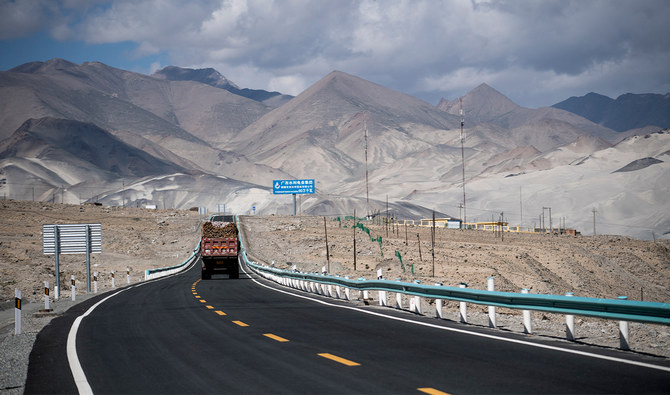KHAPLU, Gilgit-Baltistan: The high-altitude Khunjerab Pass connecting Pakistan and China remained suspended for trade for the seventh consecutive day on Thursday as traders in the northern Gilgit-Baltistan (GB) region accused the federal government of collect taxes on imports from China despite a GB court order forbidding it from doing so.
On June 22, the legislative assembly in GB, a semi-autonomous region administered by Pakistan, unanimously approved a resolution demanding the federal government stop collecting taxes on goods imported from China that arrive through the Khunjerab Pass.
On July 20, the Gilgit-Baltistan Chief Court declared as illegal the collection of income tax, sales tax and additional sales tax by Pakistani revenue authorities on goods imported from China through the Khunjerab Pass.
Scores of traders have been holding a sit-in at the Sost dry port near the Khunjerab Pass since July 26, accusing authorities of not implementing the GB Chief Court’s order. The protest has disrupted immigration procedures and suspended trade activities at the border.
“We have been protesting and staging a sit-in for the last week in front of the NLC (National Logistics Cell) office,” Javed Hussain, a former member of the GB Assembly and a businessman, told Arab News.
“Our sole demand is that we want exemption of sale tax and income tax because of the honorable GB court’s decision and the GB Assembly’s resolution, and we will not end the sit-in unless our demands are met.”
Khunjerab Pass is the highest paved international border at more than 4,600 meters (15,000 feet) above sea level, linking Pakistan’s GB to China’s Xinjiang province.
Imran Ali, president of the GB Chamber of Commerce and Industry, said traders had tried to negotiate a solution with officials many times over the past month but to no avail.
“Now, after symbolic protest for a month, we are here staging sit-ins for the last seven days,” Ali told Arab News. “GB and Kashmir have special status and the government cannot collect taxes from GB on goods imported from China.”
Bakhtiar Muhammad, a spokesperson for Pakistan’s Federal Board of Revenue (FBR), said the GB court had issued an interim order on last Saturday without hearing the FBR to allow the release of goods of importers without charging sales tax and income tax as these taxes were not leviable in GB.
“The federal government’s view is that the GB court has no legal jurisdiction on federal levies. Besides, these goods are not for consumption in GB, rather these are transported to other areas of Pakistan, where both these laws are applicable,” he told Arab News.
“A request for urgent hearing had already been filed with GB court but due to holidays, it shall be heard on 5th Aug.”
The FBR has called a meeting of its lawyers and officials on Monday to decide whether to implement the GB court’s decision or to challenge it in the Islamabad High Court, according to Muhammad.
According to the Trade Development Authority of Pakistan (TDAP), 96 percent of Pakistan-China trade consists of China’s exports to Pakistan, while Pakistan’s share of exports to China is only 4 percent.
The main items imported from China into Pakistan are electronic items, shoes, garments and spare parts, while Pakistan exports gemstones, dry fruits, medicinal herbs and some clothing items to China.
Protesters demanded the government close the customs collectorate in GB and ensure free delivery of trade goods from China to local traders dealing in baggage.
“If our demands are not fulfilled, then our next stage is that we will block the Karakorum Highway and all CPEC-related activities will be suspended,” Ali warned, referring to the multi-billion-dollar China-Pakistan Economic Corridor project.












